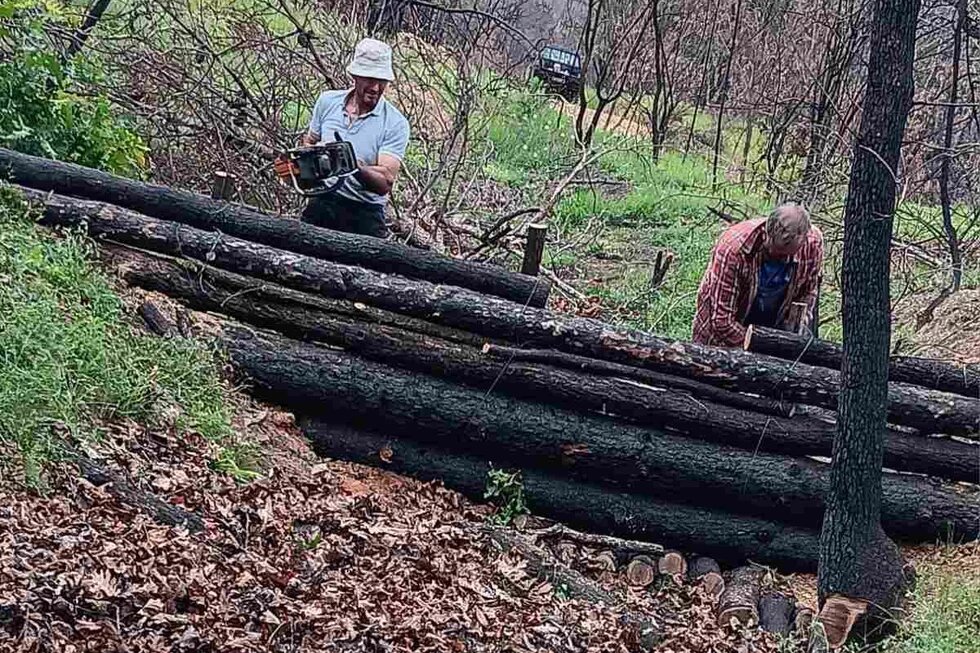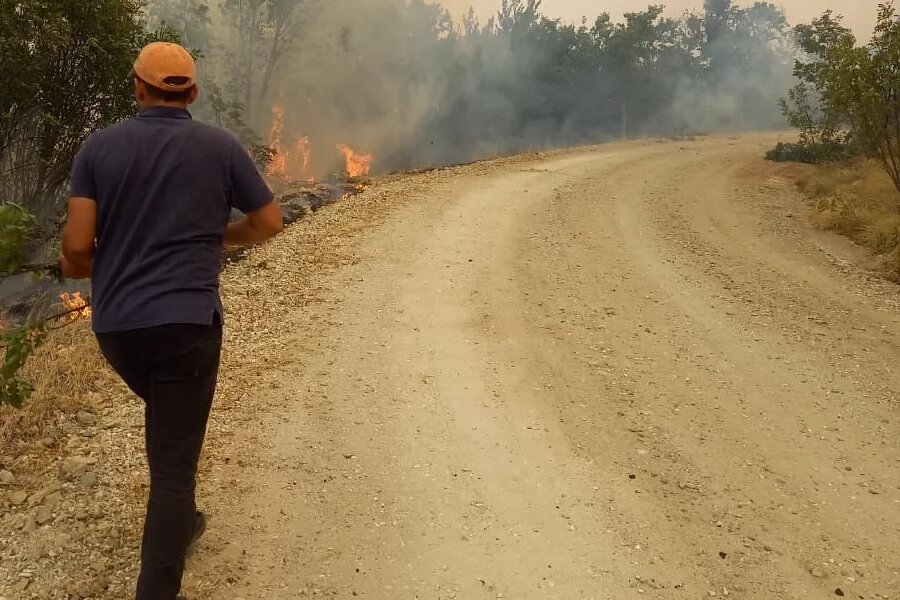
In recent years, amid prolonged heatwaves, fires have broken out even during “off-season” periods, burning thousands of acres of forest, resulting in the loss of human lives, wildlife, and biodiversity. The discussion on how to address them has expanded not only at the level of suppression measures but mainly on that of prevention.

In an attempt to explore different perspectives on what a forest is and how these ecosystems could be effectively protected, we talked with people who live and work in them daily. They are forestry workers and members of forestry cooperatives with a long history and extensive experience in forest conservation and forest firefighting. Unfortunately, the state neither acknowledges the significance of their work nor their contribution to extinguishing the recent large-scale fires in the country. However, it was precisely this contribution that highlighted the crucial need for continuous forest prevention in collaboration with forestry services, compared to the often ineffective and costly post-fire suppression efforts that drive thousands of acres of forest to extinction.
Cooperation and supervision by forestry services are essential
We talked to Hassan Istambol from the Petrolofos Forestry Cooperative, located in the Pomak villages of Evros. The residents of this village, as well as those in the nearby Sidirochori, live within the forest and are professionally engaged in livestock farming and logging as members of forestry cooperatives. With minimal resources but armed with experience and knowledge of the ecosystem’s peculiarities, they were the ones who created a firebreak during the large Evros wildfire in August 2023, ultimately saving 10.000 hectares of productive forest.
“For us, the forest is everything, it is our heart. We live in the mountains, and we live off the mountains”, these are the first words of Hassan Istambol, president of the cooperative.
As he recounts, the cooperative was founded in 1989 to provide work for the village. It currently has 50 members, all residents of the area, who collaborate with the Forestry Service logging the forest which consists mainly of oak, beech, and pine, and is very rich in biodiversity.
“I started this job in 1986 with a group that later evolved into a cooperative. I have been working non-stop for 38 years. In the past, we had more members in the cooperative, but unfortunately, many young people migrated to Germany and the Netherlands. This is not an easy job, anyway. No matter how well you know it, there is always danger, every day you fear that a branch or a tree might fall on your head. We live from logging, the Forestry Service tells us which trees should be cut, and then we sell them”. According to him, this logging process contributes both to forest renewal and the removal of critical flammable material.
During our conversation, Mr. Istambol takes us straight to the region’s most difficult period, the great wildfires:
“We helped in the fires of Dadia in 2022, in 2023, and in every wildfire because all of us in the cooperative love the forest. We don’t need a wage or any other incentive to go and save it. We all went as volunteers. In 2022, we spent ten days non-stop on the mountain to put out the fire in the Dadia forest, and in 2023, we were at the fire front every single day and that’s how we managed to save a large part of the forest, starting from Treis Vryses to Kallithea, 42 km from Alexandroupolis. It was an extremely dangerous moment when the fire could reach the north, where the forest is highly productive”.
For Hassan Istambol, in such critical moments, cooperation and supervision by forestry services are essential: “When you have someone from the Forestry Service with you, even just seeing their shadow, you understand that they care about what’s happening. That’s when you also feel like a soldier in battle. That’s what happened in 2023, we had a forest engineer and a forest ranger with us. For days, 24 hours a day, we didn’t let the fire pass. Since we’ve spent years in the forest and have experienced wildfires, we know where to ‘catch’ it from, where to start in order to put it out”.
The knowledge of a place is of immense importance, as Hassan Istambol explains. Even trained firefighters who are unfamiliar with the area often throw up their hands,
“In the 2023 fire, they sent trained wildfire hikers to the area, and within a few hours, they said, ‘there’s nothing we can do here.’ Then we took over the firefighting, not by standing in front of the fire, but from behind. We followed it and managed to put it out using branches. In Dadia, we created a large firebreak and did a lot of work. Still, the cooperative alone is not enough, we need someone from the Forestry Service with us, someone to encourage us. To me, these are the most valuable people and when you see them heading home after 35 hours, you say to yourself, ‘I’ll stay.’ We left our members on night shifts, and in the morning, we rotated them”, he continues.
According to the European Commission’s Joint Research Centre, the wildfire in Alexandroupolis during the summer of 2023 was the largest single wildfire recorded in Europe since the 1980s.
“For three days, the wind was blowing, and the fire reached Alexandroupolis and then turned back towards Dadia. I don’t know what mistakes were made, but we now know that, at least in the first few days, there was no assistance from firefighting resources. When I got the call and went there, no fire trucks had arrived, no aerial support, nothing. However, protecting forests is not just about suppression and investing in equipment, which governments prioritize. The Forestry Service has been brought to its knees, and forestry cooperatives are completely ignored. The Fire Department has never come to us asking for our help”, stresses Mr. Istambol, expressing the pain and consequences caused by the state’s disregard for forestry cooperatives, both for their livelihoods and for the forests themselves.
“Cooperatives can do a lot for forest protection because they know it better than anyone. I know every path in the forest. All the authorities also know that if a message is sent, all the residents of these villages will gather, there is solidarity among us. During the major fires, we worked together with the cooperatives of Sidirochori, Megalo Dereio, and residents from all the surrounding villages. We all joined the fight without anyone asking us to. And it’s a shame because everyone knows that for these forests to regenerate, it will take decades. In fact, those that burned again will struggle to grow back”.
Neglect of forestry cooperatives and forestry services
A few kilometers from Thessaloniki, near Rentina, lies one of the oldest forestry cooperatives in Greece, the Union of Stavros Thessaloniki Forestry Cooperative, founded in 1945. Consisting of 72 members, all residents of the wider Volvi Municipality area, this cooperative has contributed for decades to firefighting efforts across Greece.
“We are involved in everything: logging, forest cleaning, anti-erosion and fire prevention works, and we make applications to all the forestry departments in the country. Unfortunately, the state has historically shown indifference to our existence and the work we do, and mainly it shows indifference to the protection of forests. Very little is allocated for prevention, while enormous amounts are spent on the suppression of fires”, initially states Alexandros Tsouralakis, secretary of the cooperative and president of the Forestry Workers' Union of Macedonia - Thrace, explaining what this means:
“We go, often voluntarily, wherever the state calls us for fire extinguishing and the creation of firebreaks. We had very good relations with the local forestry departments, and when there was a need, they would ask for our help to 'cut off the fire.' However, since the period when forest firefighting was transferred from the forestry departments to the fire service in the 1990s, all contact with us has been cut off. However, this year, after thousands of acres were burned and following mobilization by our union, the relevant Ministry asked for the names of forestry workers to assist in case of a fire. However, they still haven't asked us for any help”.
Just like Mr. Istambol, Alexandros Tsouralakis also talks about what it means to work in the forest. “We have known the forest since we were little kids. We know most of the forests in Northern Greece, it's a traditional job. Our parents and grandparents were refugees from Asia Minor. This is the work they knew, they made charcoal and cut wood. The knowledge was passed down from generation to generation. Our cooperative was pre-war. There were two cooperatives in the area, and then they merged into the Forestry Cooperative ‘The Union of Stavros’. To become a forestry worker, one attends special seminars in Thessaloniki, becomes a probationary member of the cooperative for a year, while learning the job with the older forestry workers, and then is registered as a regular member”.
And Mr. Tsouralakis clarifies that logging is not carried out arbitrarily. “A forest engineer or a forester ranger must be present to designate the area where we will log. Even in the event of a fire, we do not intervene without the guidance of the forestry service. However, as forestry services are being downgraded, so is our profession. For the past fifteen years, no hirings have been carried out in the forestry offices. This year, some recruitments were announced, but the services have been completely stripped, leading to the crime of leaving the forests at the mercy of God”.
According to him, “maintaining a forest requires management studies with scientific documentation, which only forest engineers can conduct. While thousands of young people are studying this science, the Greek state is not proceeding with hiring. As a result, traditional forestry offices (e.g., in Soufli), which once employed 100 forest engineers, now have only a handful. At the same time, forest engineers are retiring, and no new hires are being made”.
Most forests that burn are uncleaned
The consequences of these policies are now evident. As the forestry worker explains, most of the forests that burn are uncleaned, the amounts of fuel material are massive and because of this condition the power of the fire intensifies and extinguishment efforts become much more difficult.
“Proper prevention requires the forestry offices to identify the trees that need to be cut. There is guidance from scientists, who, unfortunately, have been greatly undervalued. However, when Dadia or Athens burns, then everyone rushes to react. But no one questions the root cause of this situation, how we got here. We keep buying airplanes and heavy machinery, but without prior prevention, they are useless. If logging is not carried out in time to remove fuel material and diseased trees, these will be the consequences”, he further says.
“In Northern Greece, we have rich biodiversity with beech, oak, and chestnut forests that we must protect. However, beyond neglect, there are also activities that are destroying them, such as the gold-copper mining operations in northeastern Halkidiki. While forests are our future and what we will leave for our children, especially in the new conditions of the climate crisis, I am afraid that we will leave them with a barren wasteland instead”, he concludes.
The “people of the forests” are not only sounding the alarm about the consequences of the lack of forest fire management plans due to understaffed forestry offices and services. At the same time, they are leading a way against the degradation of the natural environment and the communities connected to it. This is because they do not see the ecosystems they inhabit as mere exhibits or sites for industrial and other forms of exploitation, but as a complex web of relationships that sustain life, both human and non-human.